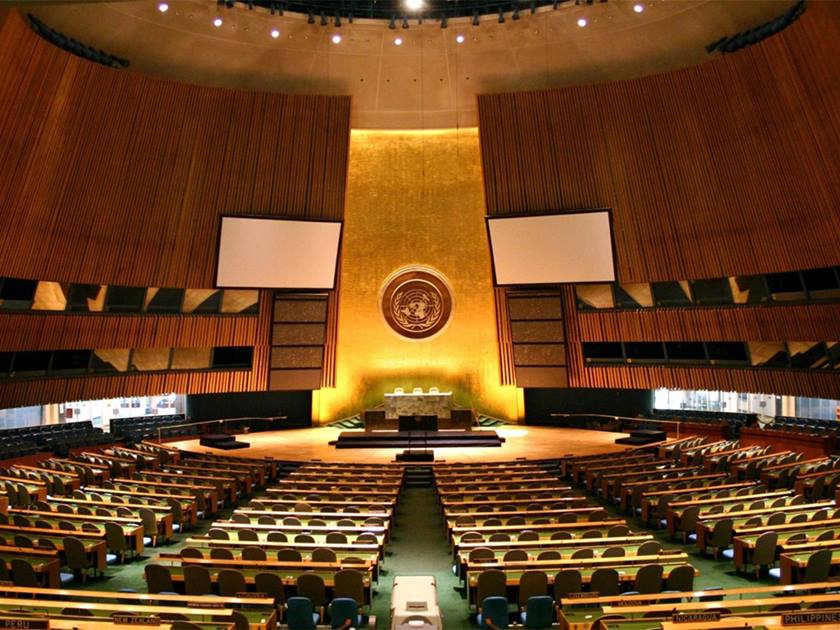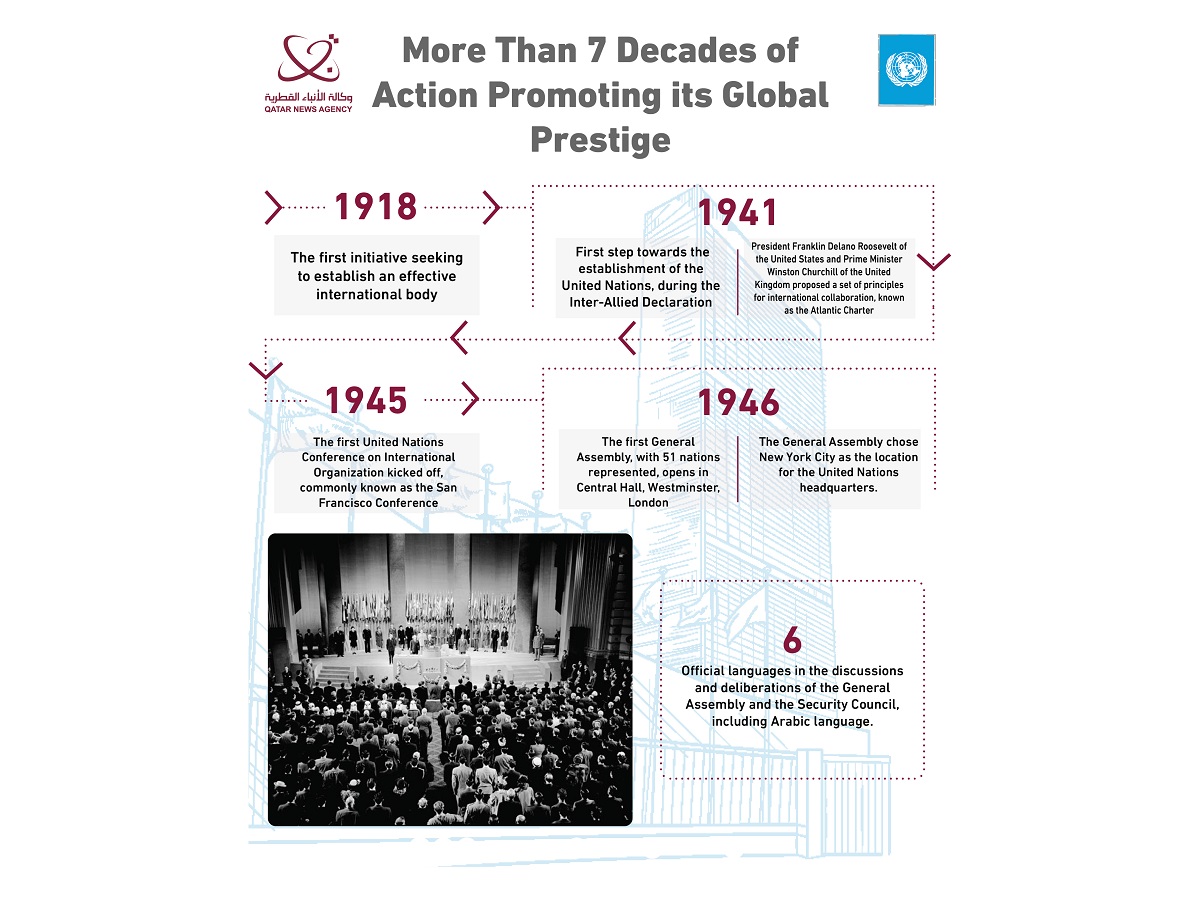Doha, September 13 (QNA) -The United Nations (UN) went through several historical phases before it formally came into existence in 1945 on the ruins of a previous international organization, with the First and Second World Wars playing the most crucial roles in determining its identity, objectives, and orientations.
The emergence of the UN, as the most prominent international body since the middle of the 20th century, coincided with accelerating regional and international developments. Those developments posed challenges and threats to international peace and security, prompting the creation of an arbitration mechanism concerned about adjudicating disputable issues, and ensuring stability worldwide.
At the outset of the 20th century, several initiatives were devised to fulfil the critical need for an international body aimed at settling disagreements and disputes and stopping mounting fighting. However, all those initiatives went up in smoke due to the then warring parties' conflicting interests and the growing colonialism as a Western attempt to finance the industrial revolution and pay the extravagant bill of its renaissance.
The first initiative seeking to establish an effective international body with the aim of bringing all parties to the negotiating table was devised in 1918 following the assassination of Archduke Frantz Ferdinand of Austria, the heir presumptive to the throne of Austria and Hungary, along with his wife during a visit to Sarajevo, the capital city of Bosnia and Herzegovina. This assassination triggered a series of incidents that culminated in the outbreak of World War I.
With the nations being extensively militarized and youths and men increasingly caught up in the raging wars, influential voices in Britain and the United States called for the creation of a permanent international organization that preserves international peace, security and cooperation. An enthusiastic proponent of this approach was the 28th US president Woodrow Wilson, who, in 1918, formulated his 14-Points statement regarding the aspired international body to end the war.
A few months later, the warring parties announced ceasefire before the allies convened at The Paris Peace Conference to establish the terms of peace and agree on the establishment of the League of Nations.
A year later, Wilson submitted the Treaty of Versailles and the Charter of the League of Nations to the US Senate floor for ratification. Although the senate rejected the treaty, the establishment of the League of Nations was formally declared in Jan. 10, 1920 with the UK, France, Italy and Japan as the permanent members. Then the charter, which was ratified by 42 countries, was put in force.
Despite never being a League of Nations member, the US kept backing the newly founded international body's economic and social duties via the activities of private charities as well as dispatching US representatives to its committees. However, over the subsequent years, the League of Nations was found incompetent to achieve its aspired objectives, and this failure was highly manifested during the 1930s economic crisis.
The relative successes achieved by the League of Nations in the 1920s were insufficient for the international body to gain the confidence of its members and other states worldwide. This was demonstrated in the League's failure to take measures to stop the Japanese invasion of Manchuria in Feb. 1933, or to prevent the eruption of the Second Italo-Ethiopian War.
Since the outbreak of World War II in 1939, the League' Geneva-based main headquarters along with all other bureaus were shut down. This vacuum in international arbitration continued until the Inter-Allied Conference that resulted in the Declaration of St James's Palace (aka the London Declaration) on June 12, 1941 as the initial step towards the establishment of the United Nations.
In Aug. 1941, US President Franklin Roosevelt and British Prime Minister Winston Churchill drafted the so-called "Atlantic Charter" to determine the goals of the post-war world. Eight governments-in-exile of the countries under occupation of the Axis Powers along with the Soviet Union and representatives of the Free French Forces, announced they were unanimously committed to the common principles of policies proposed by Britain and the United States, during the subsequent meeting of the Allied Council in London on September 24, 1941.
On Jan.1, 1942, Roosevelt, Churchill, Diplomat Maxim Litvinov of the Union of Soviet Socialist Republics (USSR), and Chinese politician Song Zedong signed the United Nations Declaration. On the following day, representatives of 22 other countries signed the declaration to make the 'United Nations' an official term for the Allies during World War II. Later on, the states seeking to join the newly-born international organization in its new form were required to sign the United Nations declaration first and then declare war on the Axis countries.
After three years, another 21 countries signed the United Nations Declaration, and after months of planning, the San Francisco Conference was held in 1945 with participation from delegates from 50 Allied countries and a number of non-governmental organizations. At that time, Churchill urged Roosevelt to return France to its status as a major power in the wake of the liberation of Paris in Aug. 1944, to complete the drafting of the United Nations Charter in the following two months. Representatives of 51 countries opposed to Germany and Japan signed the Charter on June 26, 1945 to be put into force formally on October 24, 1945, after it was approved by the five permanent members of the UN Security Council-- the United States, Britain, France, the Soviet Union and China-- as well as the majority of the other 46 signatories.
The first meetings of the UN General Assembly were held with participants from 51 countries, and the Security Council convened in London in January 1946. The General Assembly chose New York City as the location for the United Nations headquarters, to establish the most important international organization ever on the ruins of the League of Nations that dissolved in 1946 after it failed to maintain international peace and security.
The United Nations was established on the basis of universal goals that thwart the eruption of wars and international conflicts. The preamble to the UN Charter states, "We, the peoples of the United Nations, have made it our duty to rescue future generations from the scourge of war that twice brought untold sorrows to humanity." Among the aims of the UN also comes the protection of human rights through legal instruments and field activities and providing humanitarian assistance to regions suffering from natural and conflict-related disasters.
The United Nations Charter also determines the purposes of its establishment, including taking effective collective measures to prevent and eliminate threats to peace, to develop friendly ties among nations on the basis of respect for the principle of equal rights and self-determination of peoples, and to promote and encourage respect for human rights and fundamental freedoms for all without distinction as to race, gender, language, or religion, in addition to being a center for coordinating the actions of countries in achieving these common goals.
The United Nations has developed steadily since 1945, particularly after the large-scale decolonization trends since the 1960s, with 80 former colonies gaining their independence, including 11 trust territories. The UN's five main organs-- General Assembly, Security Council, Economic and Social Council, International Court of Justice, and General Secretariat-- contributed to consolidating its successes and its position in the international arena, after the sixth of these organs-- the Trusteeship Council-- suspended its functions on the Nov. 1, 1994, a month after the independence of Palau, which is the last remaining UN trusteeship territory.
Four of the UN's five principal organs are based at the organization's headquarters in New York City, while the International Court of Justice is located in The Hague. Most of the other major agencies are based in the UN offices in Geneva, Vienna, and Nairobi.
The UN also includes 15 specialized agencies-- the International Civil Aviation Organization, the Food and Agriculture Organization, the UN Industrial Development Organization, UNESCO, the International Labor Organization, the International Maritime Organization, the World Meteorological Organization, the World Intellectual Property Organization, the World Health Organization, the Tourism Organization The World Bank, the International Fund for Agricultural Development, the International Monetary Fund, the World Bank Group, which includes under its banner the International Development Association, the International Bank for Reconstruction and Development, the International Finance Corporation, the International Telecommunication Union, the International Postal Union.
The UN depends on two types of funding sources-- the mandatory contributions, which are collected by member states as a condition of membership and vary according to the total national income and population, as well as voluntary contributions. These funds are directed to finance the organization's regular budget and a few of its programs and agencies, in addition to peacekeeping operations.
Regarding the voluntary contributions, member states provide them as assistance to the UN, with many international organizations relying mainly on these funds to implement their programs, especially the UNICEF, the United Nations High Commissioner for Refugees, and the World Food Program. The UN budget for 2020 was estimated at $3.1 billion, a large segment of which is allocated to its primary mission of establishing international peace and security.
Beside addressing global challenges, the UN sought to enhance its responsibilities and democratic legitimacy by further involvement into the civil society activities worldwide. This principle was further consolidated by airing the first-ever public debate between candidates standing for the position of Secretary-General in 2016, that brought in Jan. 2017 former UN High Commissioner for Refugees Portuguese diplomat Antonio Guterres as the ninth UN Secretary General before being re-elected for a second five-year term on June 8, 2021.
The United Nations, which includes 193 member states, uses six official languages in the discussions and deliberations of the General Assembly and the Security Council. These languages are English, Arabic, Chinese, Spanish, French and Russian. The UN General Secretariat only adopts English and French.
The annual regular session of the UN General Assembly starts in the third week of September. It is held intensively between September and December, and then reconvened in January until all items on the agenda were discussed, a process that may continue until near the start of the next session, providing an annual opportunity for world leaders to hold direct meetings in New York. In the General Assembly meetings, all sovereign member states have the right to vote, while the Vatican does not.
Extraordinary sessions of the General Assembly can also be held if requested by the Security Council, the majority of Member States or one of them, with the consent of Member States, in addition to the possibility of holding emergency extraordinary sessions within 24 hours at the request of the Security Council if nine of its Member States vote in favor of it. It can also convene if the majority of Member States requested, or one of them provided the consent of rest of the Member States.
Since the 60th General Assembly session held in 2005, it has become a custom for the President-elect to select a topic with a global dimension for discussion during the following session. The topic is chosen according to informal discussions with Member States, the outgoing General Assembly President, and the Secretary-General. After winning the General Assembly presidency, the elected president, sends letters to the member states informing them of the topic he chose for general debate, and asking them to make that topic the subject of their speeches.
On June 7, the UN General Assembly elected, by acclamation, Director of Environmental Sustainability in the Office of the President of Hungary, Ambassador Chapa Korosi, as President of the 77th session of the Assembly, which begins on September 18, to succeed Maldivian Abdullah Shahid. Also, 21 deputies to the general Assembly President were elected including representatives of the five permanent members of the Security Council-- the United States, Russia, Britain, France and China.
The UN further involved in efforts to look for emerging issues, particularly means to combat global warming and atmospheric pollution, supporting youth initiatives, championing womens issues, economic empowerment of the poor segments worldwide, resisting racial discrimination, and popping up modern technology to improve human life as well as backing and financing civil initiatives and other topics emanated from the new global reality.
In this context, the 2000 Millennium Summit discussed the role of the UN in the 21st century, with the participation of the largest gathering of world leaders throughout history. The summit witnessed all member states unanimously adopting the Millennium Development Goals, a commitment to achieving international development in scopes such as poverty reduction, gender equality and public health.
Another historic UN summit, held in September 2015, saw world leaders also adopting the 17 Sustainable Development Goals and their 169 goals within the framework of the 2030 Sustainable Development Agenda, to be implemented as of January 2016. The sustainable development goals are mainly derived from the developmental goals seeking to end abject poverty, stop HIV transmission, provide education for all children, combat inequality, as well as addressing climate change, and other programs with local and international dimensions.
The coming UN General Assembly will see world leaders taking stock of current major files that top the priorities of the international public opinion, at top of which is the Feb. 24 Russian military operation against Ukraine, an issue that requires an urgent solution given its calamitous repercussions on the global economy and profound impact on the livelihood of millions of people, particularly amid disruption of the supply chains of grains from the key producers, and the expansion of hunger and poverty, as well as the significant hikes in energy prices and inflation levels, which puts the whole world and the global gains achieved over the past years on the line.
International calls are increasingly circulating demanding an end of the war in Ukraine to preserve the remaining hopes of overcoming the repercussions of the Moscow-Kyiv crisis, the COVID 19 pandemic and their colossal impacts on the global growth rate, the performance of economies in general, and the life of all mankind.
Also among the prominent issues on the discussion table during the 77th UN General Assembly will be the global food crisis stemming from recurrent conflicts in several parts of the world and the urgency to reach binding agreements on global warming and its devastating impacts including expanded forest fires, heatwaves and rising seas and oceans, as well as the scarcity of water.
(QNA)



